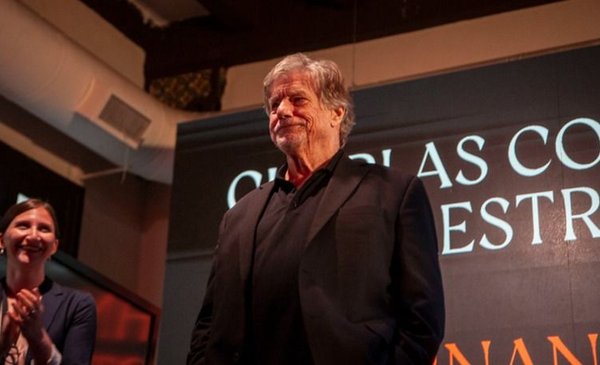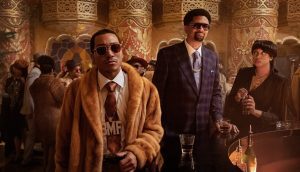Movies stopped showing normal people talking about superheroes.

November 9, 2022 – 13:38
The Tribuno de Jujuy was part of a talk given by the director of “Duro de Mata” in the framework of the 37th Mar del Plata International Film Festival.
The Mar del Plata International Film Festival will be held in that coastal city until November 13, and among the guests, who took part in the “Talks with Teachers” course, was the notable attendee of North American director John McTiernan, who had to be credited with two films that draw attention to the legions of Fans: ‘Predator’ and above all ‘Hard to Kill’. El Tribuno de Jujuy was part of the conversation given by the prominent director of the Spanish club located in the center of Mar del Plata and at this opportunity the director, who revolutionized modern action cinema with a feature film that also includes titles such as “The hunt for Red October” “The Last Great Hero” and “The Thomas Crown Affair,” he spoke about his career and even gave his opinion of today’s Hollywood, which has turned into the land of superheroes.
Thus, in the first place, he said that the foundations of his career lay in his film patronage. “When I was in film school I found out that I already knew dozens of films and I owed my mother. My father did not allow her to work and she was a very active woman and in order not to get bored and sad I went to the cinema and accompanied her since she was two years old and watched all kinds of films, not children’s films. They say. 10,000 hours of concentration is required to be a specialist in something, and my mother actually gave me those hours that would take me to the movies.”
Later he told how his career was strengthened. “I was ambitious and wanted to be part of an era and I wanted to make films because it is an activity that combines beauty and engineering. Before studying cinema, I studied anthropology, and making cinema is also looking at people and trying to understand what is happening to them.”
He mentioned his fondness for European cinema, highlighting François Truffaut.
“I wanted to know what a movie was, because if you want to make a movie, you have to know what we’re talking about. And one day I went to see ‘American Night’ and knew Truffaut was a genius. Then, at a Broadway art theater, I went to see a series of The screenings of this French director, and I watched his films for several days from 7:30 am to 1:30 pm, and I think I was able to come to a conclusion., a very simple and specific definition of what a film is. It is a series of images in a certain order.
He kept talking about his beginnings. “While I was a student at Juliard, at Experimental Film School and the American Film Institute, I did more than 45 films, different types of experiments, imitating films, making scenes, animations, learning the basics about the special effects of those times. I worked as an assistant to one of my great professors , the Academy Award winner, Jan Kadar, was the one who pushed me forward and taught me how to watch movies.I devoted myself to research, for example I saw Stanley Kubrick’s A Clockwork Orange and counted the shots, scenes and camera movements and wrote them down until I knew them by heart.For example, The latter has 620 aircraft.”
An anecdote with Mel Gibson is revealed. “He asked me to work on Apocalypto and after I watched it once thanks to this working methodology, I wrote each sequence from memory with his camera movement. He was very impressed. This is a great trick I use to impress people,” he joked, while conjuring up another memory with the actor. “The only movie I refuse to direct and I’m so sorry is ‘Corazón Valiente’, unfortunately he didn’t ask me personally but the scriptwriter who was a believer, an arrogant person, couldn’t stand it and rejected it and later regretted it.”
He then referred to how he got to his first feature film, “The Bedouins”. “I could have made a horror movie or a teen movie, something that would make money, but I was going to copy other movies, and what I really wanted out of my first commercial was to show that I had cinematic tracks,” he said.
Then he made reference to his second commercial film “Predator”. “And here for my production, I focused on making money and chose Predator. I really liked the script because it was so simple and innocent. It was impossible to be wrong and I thought about it from a pochoclero’s point of view, I thought the audience would love it. And it wasn’t too hard to do a good job. “.
He recounted how “It’s Hard to Kill,” which produced a break in cinema, became. “Before that, they put the director of the second unit to shoot the action scenes, who were generally retired businessmen, good guys but with limited abilities. I was able to participate in the “Predator” in the action scenes and everyone was surprised what can be achieved on a tape of this type. And in Hard To Kill I managed to do all the scenes myself. ”
Ultimately, McTiernan asked to speak privately about superhero films. In this regard, he said that the graphic representations made by people from their time throughout history have always been associated with the powerful. “It was only in the middle of the eighteenth century in France that artists began to represent people of their kind. And only a few decades later, these same men took over the Bastille and guillotine for King Louis XVI. The instruments of representation are no longer the property of only the rich.”
Then the director stated that “until the mid-nineties, the big studios were run by people who are familiar with cinema or by smart people who are interested in spreading culture in the world”, but “unfortunately at that time, they were bought by banks and companies. People who were not interested in cinema. , but they were just stewards who worked to protect the interests of the rich and ensure the greatest amount of profit for their investors, he continued: “The films of the next ten years ceased normally. People, but they cannot represent kings and nobles either.” He concluded by saying, “What did the great cinematographer of the United States do then? He started talking about witches or superheroes. This is a very clear political act, a counter-revolution of great historical importance, and therefore we must not lose sight of it. Movies have no human beings as heroes. End .

“Professional problem solver. Subtly charming bacon buff. Gamer. Avid alcohol nerd. Music trailblazer.”




:quality(75)/cloudfront-us-east-1.images.arcpublishing.com/elcomercio/6NEH6FMKYBCU7JJWZ5GVRZKTRM.jpg)
/thumbs.vodgc.net/1-14-FnXFWZ1684253239488_1080P.jpg)



